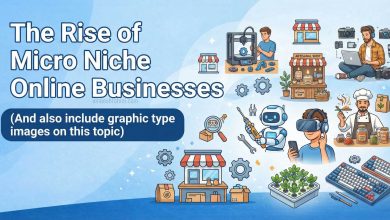Why Online Business is Better ? : A Detailed Analysis – 2024
Why Online Business is Better : In the rapidly evolving world of commerce, online business has become an increasingly dominant force, offering numerous advantages over traditional brick-and-mortar models. Online businesses benefit from lower operational costs, expanded global reach, and the ability to operate 24/7, among other perks.
Table of Contents
This essay explores these aspects in detail to provide a comprehensive understanding of why online business is better and more advantageous in today’s digital landscape.
1. Lower Operational Costs

One of the most compelling reasons why online business is superior is the reduction in operational costs. Traditional businesses require significant investments in physical infrastructure, rent, utilities, and maintenance. An online business eliminates many of these expenses, allowing entrepreneurs to allocate funds more effectively.
- No Need for Physical Space: Online businesses do not require a physical storefront, which saves a substantial amount in real estate costs. Without rent, property taxes, and utility bills, the business can operate with a much leaner budget.
- Reduced Employee Costs: Many online businesses can function with fewer employees, especially in the initial stages. Functions such as customer service, product listings, and inventory management can be automated or outsourced to freelance platforms, significantly reducing payroll expenses.
- Marketing Savings: Online businesses benefit from digital marketing, which can be more cost-effective than traditional marketing methods. With tools like social media ads, email campaigns, and search engine optimization (SEO), online businesses can reach their target audience at a fraction of the cost associated with TV, radio, or print ads.
3. Enhanced Scalability
Scalability is crucial for business growth, and online businesses can scale more efficiently than traditional businesses.
- Minimal Physical Expansion Requirements: Scaling a traditional business often requires additional space, which involves costs related to new premises, construction, and setup. In contrast, online businesses can scale up by investing in digital infrastructure, which can be done more quickly and cost-effectively.
- Easy Product Expansion: With an online business, adding new products or services is relatively simple. By analyzing online metrics and consumer demand, entrepreneurs can introduce new offerings directly to the website or platform without needing to alter the physical space.
- Global Expansion: Expanding to international markets is more straightforward for online businesses. By adjusting website language, currency options, and shipping methods, a business can easily cater to customers worldwide, which would be far more complex and costly for a physical storefront.
4. Advanced Data Collection and Customer Insights
Data is a critical asset in the digital era, and online businesses have an advantage when it comes to data collection and analysis. This information allows businesses to understand consumer behavior, improve services, and drive sales.
- Tracking Customer Behavior: Online businesses can use analytics tools like Google Analytics, which track user interactions, providing insights into which products are popular, how users navigate the site, and what influences purchasing decisions.
- Personalized Marketing: Data collected from online interactions enables businesses to create targeted marketing campaigns. By segmenting customers based on preferences, purchase history, or browsing habits, businesses can send personalized offers and recommendations, enhancing customer satisfaction and increasing sales.
- Continuous Improvement: With constant access to consumer feedback, online businesses can make data-driven decisions to enhance user experience, improve products, and adapt to changing trends. For instance, businesses can easily adjust pricing, optimize website design, or update product listings based on real-time feedback.
5. Greater Potential for Automation
Automation plays a crucial role in making online businesses more efficient, and it can significantly reduce the manual effort required to manage various tasks.
- Inventory Management: For e-commerce businesses, tools like Shopify, WooCommerce, and other platforms streamline inventory management, notifying business owners when stock levels are low and helping prevent overselling.
- Automated Marketing: Marketing automation tools, such as email automation or chatbots, allow businesses to interact with customers without direct human intervention. For instance, chatbots can handle customer inquiries instantly, providing immediate assistance while saving time and resources.
- Streamlined Payment Processing: Payment gateways like PayPal, Stripe, and Razorpay automate the transaction process, ensuring secure and fast payments without manual intervention. This automation improves the overall shopping experience and increases consumer trust in the business.
6. Evolving Opportunities for Innovation
The digital landscape is constantly changing, providing endless opportunities for online businesses to innovate and remain competitive. This is a crucial advantage, as it allows businesses to stay relevant and attract new customers.
- Product Personalization: With the ability to analyze customer preferences and past purchases, online businesses can offer customized products or tailored recommendations, enhancing customer satisfaction and loyalty.
- Subscription Models and Upselling: Many online businesses leverage subscription models, which provide a steady revenue stream. Additionally, upselling and cross-selling are simpler online, where automated prompts can suggest related or upgraded products, boosting sales.
- Augmented Reality (AR) and Virtual Reality (VR): Innovative technologies like AR and VR allow businesses to create immersive experiences for customers. For example, a furniture company might offer AR capabilities that let customers visualize how a product will look in their space, making it easier for customers to make purchasing decisions.
7. Improved Customer Engagement and Brand Loyalty

Customer engagement is easier to achieve online, and businesses can employ various strategies to build relationships with their audience, fostering loyalty and repeat purchases.
- Social Media Interactions: Online businesses can engage directly with customers on social media platforms, responding to queries, gathering feedback, and sharing updates. Platforms like Instagram, Twitter, and Facebook allow brands to create a community around their products, boosting brand loyalty.
- Email Marketing and Newsletters: By collecting customer emails, businesses can send newsletters, discounts, and personalized content to keep customers engaged. Regular communication through emails helps maintain the brand’s presence in customers’ minds, encouraging repeat business.
- Loyalty Programs: Online businesses can easily implement loyalty programs that reward customers for purchases, referrals, or social media engagement. These programs incentivize customers to return, enhancing customer lifetime value.
8. Eco-Friendly and Sustainable Operations

Online businesses have a smaller environmental footprint compared to physical stores, which is increasingly important to today’s eco-conscious consumers.
- Reduced Carbon Emissions: Online businesses do not require customers to travel, which reduces carbon emissions from commuting. Additionally, online businesses can consolidate deliveries, which is often more sustainable than individual trips to a store.
- Paperless Operations: Online businesses often operate in a largely digital environment, reducing the need for paper in invoices, receipts, and promotional materials. This paperless approach not only cuts costs but also contributes to environmental conservation.
- Efficient Resource Management: Without the need for physical premises, online businesses can optimize inventory and packaging, reducing waste. Many online businesses are adopting sustainable packaging solutions to further align with eco-friendly practices.
9. Lower Barriers to Entry for Entrepreneurs
Starting a traditional business often requires a significant upfront investment and can involve complex regulatory processes. Online business models are generally more accessible, making it easier for new entrepreneurs to enter the market.
- Minimal Startup Costs: For many online businesses, startup costs are limited to website hosting, domain registration, and basic digital marketing expenses. This low-cost entry makes it easier for individuals with limited capital to start their own ventures.
- Access to E-commerce Platforms: Platforms like Etsy, Shopify, and Amazon allow individuals to start their own online stores without needing technical expertise. These platforms provide templates, payment gateways, and shipping solutions, streamlining the setup process.
- No Geographic Constraints: Online businesses do not have to consider location-based factors, such as local foot traffic or real estate prices. This freedom allows entrepreneurs to focus on niche markets and unique product offerings without the need for physical presence.
Why Online Business is Better : Conclusion

In conclusion, online businesses offer a multitude of advantages over traditional models, including lower costs, increased flexibility, scalability, and access to valuable customer insights. The rapid growth of e-commerce and digital marketplaces underscores the appeal and effectiveness of online business models.
Also Read : How to Become an Affiliate Marketer in 2025
As more consumers shift to online shopping and remote work becomes the norm, online businesses are likely to continue their upward trajectory. For entrepreneurs, small business owners, and even established companies, the digital world offers an array of opportunities that make online business not only a viable option but a preferable one.
Buy Now : News & Magazine Website AI Automated
The future of commerce is undoubtedly digital, and businesses that embrace this shift are well-positioned to thrive in an increasingly connected world. Whether you’re an aspiring entrepreneur or an established business looking to expand online, the advantages outlined in this essay make a compelling case for why online business is the future and why it’s ultimately better for both business owners and consumers alike.
Keywords : Why Online Business is Better – Why Online Business is Better 2024 – Why Online Business is Better 2025 , Why Online Business is Better ?



